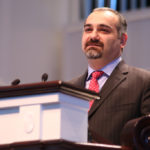WACO—Genocide of religious minorities and assaults on religious freedom that have fueled an international refugee crisis demand a response from Christians and other people of good will, panelists at a Baylor University forum agreed.
Until recently, both the government and churches in the United States remained mostly silent, said members of the panel—a retired congressman, a pastor of an Arabic-language Christian church in North Texas, an official with an advocacy group devoted to helping persecuted Christians worldwide and a university president.
 Assaults on religious freedom represent the pre-eminent contemporary human rights issue, said former Congressman Frank Wolf, senior fellow with the 21st Century Wilberforce Initiative. (Photo / Ken Camp)“America’s First Freedom—religious freedom—has never been under more assault, both at home and abroad, than it is today,” said Frank Wolf, former U.S. congressman from Virginia, who holds the Jerry and Susie Wilson Chair in Religious Freedom at Baylor. “The task is urgent. The stakes are high. What remains to be seen is whether the people of God will rise to the occasion for such a time like this.”
Assaults on religious freedom represent the pre-eminent contemporary human rights issue, said former Congressman Frank Wolf, senior fellow with the 21st Century Wilberforce Initiative. (Photo / Ken Camp)“America’s First Freedom—religious freedom—has never been under more assault, both at home and abroad, than it is today,” said Frank Wolf, former U.S. congressman from Virginia, who holds the Jerry and Susie Wilson Chair in Religious Freedom at Baylor. “The task is urgent. The stakes are high. What remains to be seen is whether the people of God will rise to the occasion for such a time like this.”
Pre-eminent human rights issue
Assaults on religious freedom represent the pre-eminent contemporary human rights issue, said Wolf, senior fellow with the 21st Century Wilberforce Initiative.
“In Nigeria … Boko Haram is burning churches, destroying villages and killing pastors,” Wolf said.
Two years ago, the Islamist terrorist group kidnapped 276 girls from the Chibok Government Secondary School. Americans responded with a Twitter hashtag—#BringBackOurGirls—but no substantive action, Wolf noted. And the schoolgirls remain in captivity, likely the victims of repeated sexual assault, he added.
Genocide in Iraq and Syria
“In Syria, almost 300,000 people have been killed, and the West stands by and does almost nothing,” Wolf said.
Sign up for our weekly edition and get all our headlines in your inbox on Thursdays
Fewer than 250,000 Christians live in Iraq today, compared to 1.5 million in 2003, he said, and 17 Christian families a day are forced out of the country. About 150,000 Jews lived in Iraq 65 years ago, but only 10 Jewish families live there now, he added.
“First the Saturday people; then the Sunday people,” he said, a phrase attributed to Islamist extremists who focus first on eliminating Jews, who observe the Sabbath, and then on Christians, who worship on Sunday.
“Overall, the church has been relatively silent” about the genocide of Christians and other religious minorities in Iraq and Syria, Wolf lamented. He noted a few prominent exceptions, such as Pope Francis and Rick Warren, a high-profile Baptist pastor in Southern California.
“For the longest time, the world stood by,” he said, pointing also to U.S. government inaction.
However, he noted hopeful signs in recent weeks. On March 14, the U.S. House of Representatives unanimously passed a nonbinding resolution condemning ISIS actions as genocide. Three days later, Secretary of State John Kerry declared ISIS guilty of committing genocide against Christians and other religious minorities in Iraq and Syria.
Respond to needs of refugees
Jalil Dawood, pastor of Arabic Church of Dallas and founder of World Refugee Care, described his personal experience growing up in Iraq, where Christians are treated “as third-class citizens.” Dawood fled the country at age 18, finding refuge first in Rome and later in the United States.
Dawood urged American Christians to respond to the needs of refugees who are fleeing religious persecution.
“If the terrorist is willing to die for his faith, what are you willing to do for your faith? Are you willing to save at least one life?” he asked.
‘Rising threat of extremism’
Christians need to recognize their spiritual kinship to fellow believers globally who suffer for their faith, said Jason Peters, associate vice president of The Voice of the Martyrs, an international organization that helps persecuted Christians.
“You have family members who are suffering,” Peters said. “There is a rising threat of extremism around the world.”
 American Christians need to understand religious freedom means more than just the right to assemble for worship, Baylor University President Ken Starr said during a panel discussion about persecution. (Photo / Ken Camp)Advocacy begins with education, and American Christians need to understand religious freedom means more than just the right to assemble for worship, Baylor President Ken Starr insisted. It involves—within reasonable restrictions—the ability to live out one’s faith freely, he said.
American Christians need to understand religious freedom means more than just the right to assemble for worship, Baylor University President Ken Starr said during a panel discussion about persecution. (Photo / Ken Camp)Advocacy begins with education, and American Christians need to understand religious freedom means more than just the right to assemble for worship, Baylor President Ken Starr insisted. It involves—within reasonable restrictions—the ability to live out one’s faith freely, he said.
He cited Article 18 of the Universal Declaration of Human Rights: “Everyone has the right to freedom of thought, conscience and religion; this right includes freedom to change his religion or belief, and freedom, either alone or in community with others and in public or private, to manifest his religion or belief in teaching, practice, worship and observance.”
Starr also noted the Geneva Conventions—approved in the aftermath of World War II—define a refugee as someone unable or unwilling to return to his or her country of origin “owing to well-founded fear of being persecuted for reasons of … religion,” among other enumerated grounds.
“It is important to the integrity of American law that a person who has a well-founded fear of persecution shall not be sent back home,” he said. “That would be a terrible violation of American law, but it would also be a fundamental violation of the basic principles for which we stand in the United States of America.”
Support legislation
During a question-and-answer time following presentations by panelists, Wolf, author of the International Religious Freedom Act of 1998, voiced support for the International Religious Freedom Act of 2015, H.R.1150, introduced by Rep. Chris Smith, R-N.J.
The bill would grant greater authority to David Sapperstein, the United States’ ambassador-at-large for international religious freedom, create a more stringent standard for evaluating violations of religious liberty and hold offending nations to a higher level of accountability.
It also would direct the president to appoint to the National Security Council a special adviser for global religion engagement and international religious freedom, making religious liberty a U.S. foreign policy priority.
Wolf, Starr and former U.S. Rep. Chet Edwards, who was in the audience, urged everyone in attendance to write lawmakers to make their views known.
“One person can make a difference,” Edwards said, adding a relatively small number of letters from deeply concerned constituents can influence how elected representatives vote.
He quoted Margaret Mead: “Never doubt that a small group of thoughtful, committed citizens can change the world. Indeed, it is the only thing that ever has.”














We seek to connect God’s story and God’s people around the world. To learn more about God’s story, click here.
Send comments and feedback to Eric Black, our editor. For comments to be published, please specify “letter to the editor.” Maximum length for publication is 300 words.